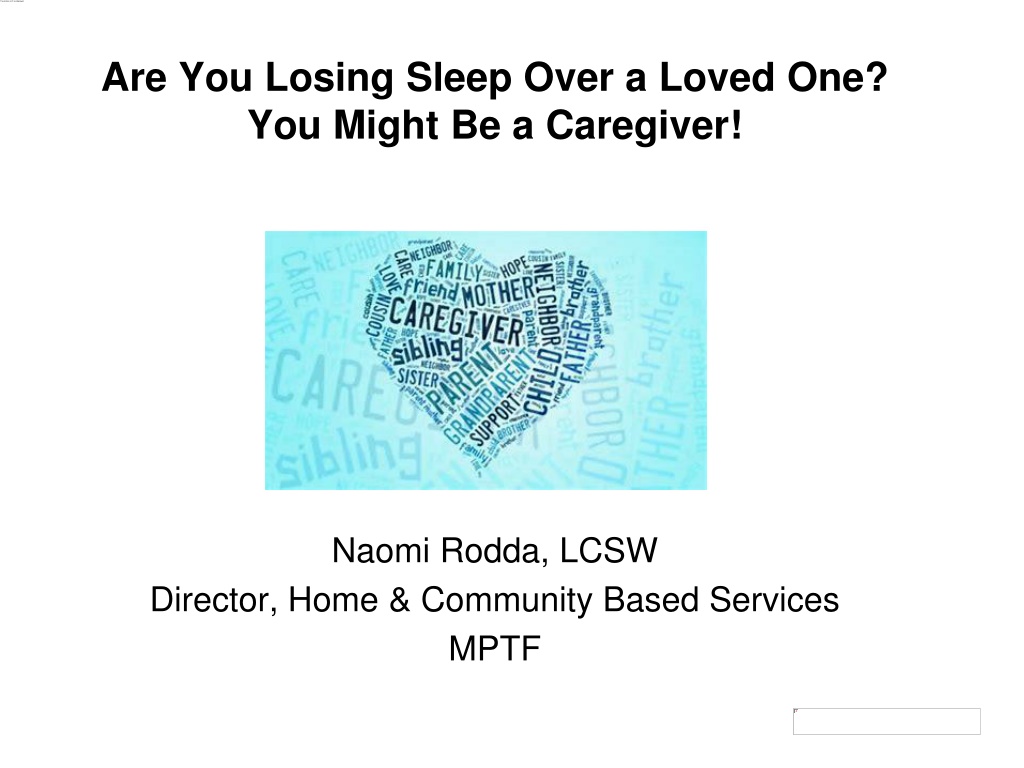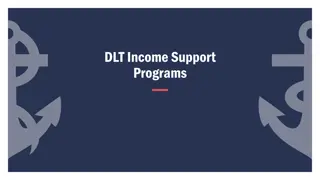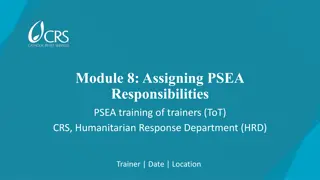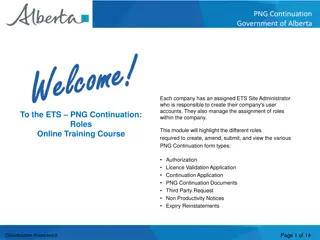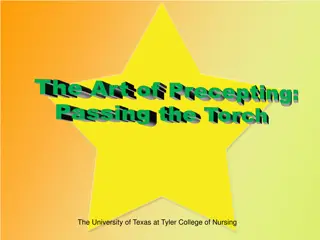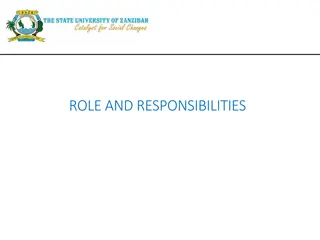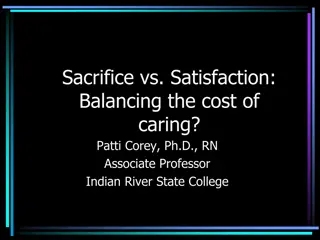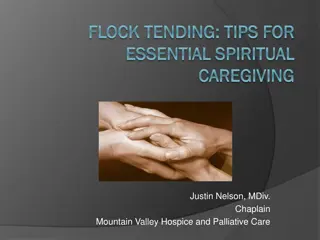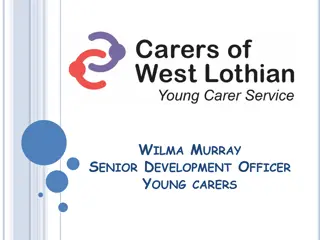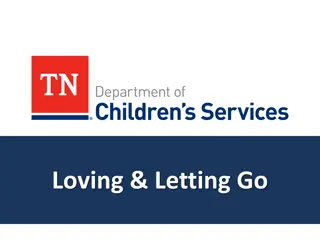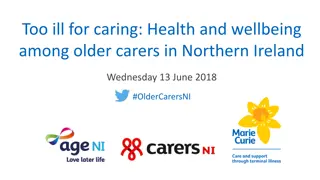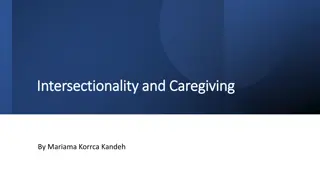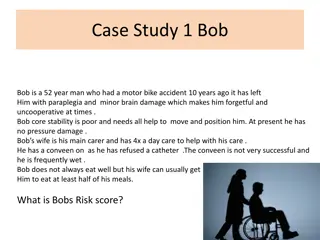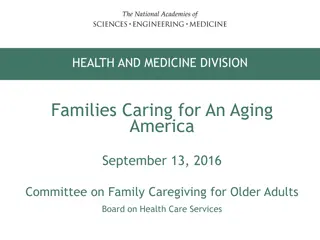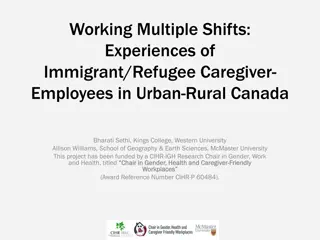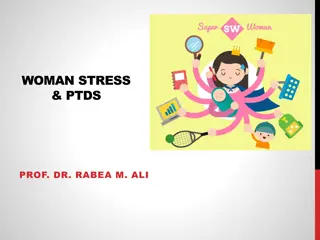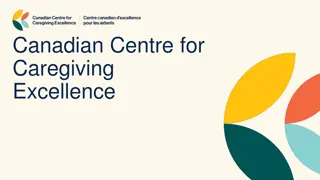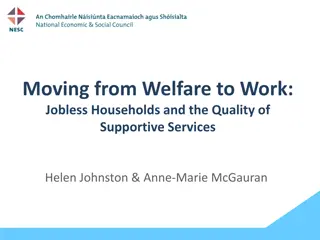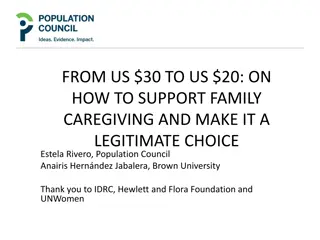Understanding Caregiving: Roles, Responsibilities, and Support
Caregiving encompasses various forms of support provided to loved ones, including companionship, logistical coordination, emotional assistance, and direct care. Caregivers, whether paid professionals or unpaid family members, play a crucial role in meeting the diverse needs of individuals requiring assistance. This presentation highlights the challenges, signs of change, dealing with difficult behaviors, and practical matters caregivers face in their caregiving journey.
Download Presentation

Please find below an Image/Link to download the presentation.
The content on the website is provided AS IS for your information and personal use only. It may not be sold, licensed, or shared on other websites without obtaining consent from the author. Download presentation by click this link. If you encounter any issues during the download, it is possible that the publisher has removed the file from their server.
E N D
Presentation Transcript
Are You Losing Sleep Over a Loved One? You Might Be a Caregiver! Naomi Rodda, LCSW Director, Home & Community Based Services MPTF
What is a Caregiver? Caregivers come in many forms. A caregiver can be: paid or unpaid providing care as a professional/paraprofessional with extensive training or as a friend or family member with no training providing financial support, in-kind support, or both any age, gender or socioeconomic status For the purposes of this presentation, the word caregiver will be defined as a family member or friend who provides care to a loved one and is not reimbursed for services.
Types of Caregiving Companionship: visiting your person at their home or bringing him/her to your home, phone call check-ins, accompanying your person on errands, etc. etc. etc. Logistical Support/Care Coordination: arranging medical appointments, pharmacy pick-up, beauty salon, grocery shopping, caregiver scheduling/reporting, IT troubleshooting, etc. etc. etc. Emotional Support: helping your person manage depression, anxiety, grief and loss, denial, anger, unrealized dreams, existential and spiritual crises, etc. etc. etc. Direct Care: meal preparation, laundry and housekeeping, bathing, dressing, toileting, etc. etc. etc. Etc. Etc. Etc.!!!
You Might Be a Caregiver If. https://youtu.be/WJUyfrsJDCY
Recognizing Signs of Change Driving Risks Mobility Changes/Falls Difficulty in Performing Independent Activities of Daily Living (IADLs) meal preparation, driving, cleaning, managing finances Increased Reluctance to Visits from Family/Friends Increased Confusion/Disorientation Personality Changes
Dealing with Difficult Behaviors Communication Denial/Resistance Autonomy and Self-Determination Why are these behaviors difficult ? How would you want to be cared for if the roles were reversed?
Practical Matters: A Glossary of Terms for Caregivers
Glossary of Terms: Health Insurance Medicare: Medicare is a federal health insurance program for people 65 years and above or younger individuals who have been ruled permanently disabled by the Social Security Administration for at least two years. Medicare is broken up into several parts. Medicare Part A covers inpatient hospitalizations. Medicare Part B covers 80% of the costs of most outpatient services. Medicare D provides partial prescription drug coverage. Individuals who do not have employer-based retiree health (i.e. MPI) need to elect additional coverage through a Medicare Advantage or supplement plan as well as a prescription drug plan in order to cover 100% of costs (minus co-pays). Medicaid/Medi-Cal: This insurance program uses a combination of federal and state dollars to provide health insurance benefits to certain persons who are elderly, disabled or low-income. For qualified individuals in a community-based setting, Medicaid/Medi- Cal can cover costs toward in-home caregivers (IHSS program), prescription medications, and secondary health insurance coverage to Medicare. Medicaid/Medi-Cal covers room and board costs at skilled nursing facilities for individuals who must remain there permanently. Long Term Care Insurance: A private insurance policy similar to a life insurance policy that can help cover in-home caregivers or assisted living facility costs. These policies require monthly premium payments.
Glossary of Terms: Important Legal Documents Part I Power of Attorney for Finances*: This legal document grants a designated individual the authority to manage another person s money and other financial affairs. This document must be notarized in order to be valid. A Power of Attorney for Finances can be set up to take effect at the request of the grantor or at such time when the grantor is formally declared incapacitated by two qualified physicians. Power of Attorney for Health Care*/Advanced Health Care Directive: This legal document grants a designated agent the authority to make health care decisions for a person who is unable to speak for him/herself. This document does not have to be notarized in order to be valid; it becomes legal with two witness signatures. One witness cannot be related by blood or marriage. Some Advanced Health Care Directives only nominate a health care proxy to make decisions; some directives also provide stipulations as to care wishes. *NOTE: In California, Power of Attorney for Finances and Power of Attorney for Health Care must be executed as separate documents. In other states, these powers of attorney may be combined and known as Uniform Power of Attorney.
Glossary of Terms: Important Legal Documents Part II Conservatorship: This legal process involves a court determination as to whether a person has the capacity to make sound decisions and manage various aspects of his/her life. Conservatorship is divided up into conservatorship of the estate (financial decisions) and conservatorship of the person (all other aspects of decision-making) . The court can rule that an individual requires a conservator for one category but not the other. If the court rules that the person should be conserved, then another party is appointed to oversee that aspect of the individual s life. Conservatorship does strip an individual of liberty; it is a serious endeavor and not one that the court takes lightly. Obtaining conservatorship is an expensive and labor- intensive process; it can be challenged by the individual at any time. It also requires painstaking record keeping and ongoing reporting responsibilities. Will versus Trust: A will is a legally enforceable document stating how an individual wants his/her affairs handled and assets distributed after death. Guardianship of dependents can also be included as part of a will s directive. A trust is a document in which an individual gives another party authority to handle assets for the benefit of a third party, the beneficiaries. Trusts are the preferred method of financial planning for estates with assets of significant value due to the increased level of protections offered. Families of individuals who die without having prepared a will or trust will have to go through probate to determine disbursement of the estate. This process is lengthy, expensive and can cause significant rifts between family members.
Glossary of Terms: The Professional Care Team Part I The Geriatrician: a physician who specializes in treating older adults. This medical provider coordinates care with other specialists, monitors medication interactions, and manages co-morbidities. A primary care physician not accustomed to treating this client population likely does not have the time to provide the comprehensive level of care needed to manage these patients. The Geropsychiatrist: a physician who specializes in prescribing psychiatric medications to older adults. Older adults are particularly sensitive to these types of medications and their interactions with other prescriptions. A psychiatrist not accustomed to treating this client population likely is not equipped to manage needs appropriately. The Social Worker/Geriatric Care Manager: a helping professional that provides overall care coordination of non-medical issues (otherwise known as case management), emotional support, crisis intervention, information and referral.
Glossary of Terms: The Professional Care Team Part II The Home Health Agency: Home health is a Medicare-covered short- term benefit for individuals who recently have been discharged from an acute hospital or rehabilitation facility. Services under this benefit can include any or all of the following: nursing, bathing assistance, physical therapy, occupational therapy, speech therapy and social services. This benefit usually lasts 4-6 weeks. The In-Home Caregivers: These caregivers provide non-medical assistance and support at home, including grocery shopping, light housekeeping, medication management, assistance with activities of daily living, transportation and companionship. Fees for in-home caregivers are paid by private funds or long-term care insurance policies.
Glossary of Terms: Community-Based Programs & Services Adult Social Day Care: Community-based setting that provides daytime respite for caregivers by offering meals, recreational activities, socialization, and supervision for physically frail and/or cognitively impaired older adults. Adult Day Health Care: Community-based setting that provides daytime respite for caregivers by offering structured programming and supervision for physically frail and/or cognitively impaired adults with higher acuity needs. Trained staff can administer medication, assist with activities of daily living and provide socialization opportunities. Meals are usually included; some programs offer door to door transportation. Fees for this service are covered by private funds and long-term care insurance policies.
Glossary of Terms: Levels of Care and Housing Alternatives Independent Living: A retirement community setting where individuals live in their own apartments but have some services provided, including laundry, housekeeping, and meals in a communal dining room. Individuals in this setting may still be driving. Most have decided that they wish to downsize from a larger home or apartment to live among their peers. Independent living is paid for with private funds. Assisted Living/Memory Care: A retirement community setting with additional supports in place for individuals who need more care as a result of physical frailty or cognitive decline. In addition to the services provided in independent living, assisted living and memory care settings also provide assistance with medication management, activities of daily living (bathing, dressing, toileting, transfers), and safeguards for individuals with memory loss who may have the potential to wander. Some offer transportation services. Assisted living is paid for with private funds or with a long-term care insurance policy. Skilled Nursing/Long-Term Care: Skilled nursing facilities are inpatient, hospital-like settings for individuals who require full-time care due to physical frailty or cognitive impairment. An individual may be discharged from a hospital to a skilled nursing facility for a short-term rehabilitation stay after a hospitalization with a plan eventually to return home. Others may require this level of care permanently. Medicare covers the cost of short-term rehabilitation stays; Medi-Cal/Medicaid covers the cost of long-term stays.
Signs of Caregiver Burnout Physical Signs: Shortness of Breath Heart Palpitations Changes in Sleep Habits Changes in Eating/Dietary Habits Headaches Hair Loss Gastrointestinal Issues Emotional Signs: Irritability Difficulty concentrating Forgetfulness Feelings of guilt, resentment, anger, overwhelm Anxiety Depression Social Signs: Increasing isolation/withdrawal from friends and family Relationship tensions with spouse/partner Increased substance use Issues with job performance
Risks of Caregiver Burnout Development or Exacerbation of Physical Illness: Studies have shown that caregivers are at increased risk for cancer, diabetes, heart disease, high blood pressure, obesity and other chronic illnesses. Development of Exacerbation of Mental Health Issues: Studies have shown that caregivers are at increased risk for depression, anxiety, panic attacks, insomnia and chronic stress response. Social Isolation: Caregivers often find themselves increasingly socially isolated from co-workers, friends, and even family as their loved one s needs increase. Caregiving responsibilities can have a detrimental impact on work performance, partner relationships and social connectivity, as the caregiver must increasingly prioritize the needs of the ill individual over other aspects of his/her personal life. Premature Death: Caregivers often neglect their own health and well-being in service of the ill individual. As a result, in some cases, a well spouse or adult child actually may pre-decease the person for whom they were caring.
Five Questions to Ask What is my loved one s expectation of me, and is that realistic? What is my expectation of myself, and is that realistic? Do I have a line in the sand? What is it? Where can I go to get support and from whom? What am I doing for self-care?
How Does MPTF Help Caregivers? Elder Connection: MPTF s Elder Connection social workers provide needs assessment, case management, counseling, information and referrals for industry members 65+ or younger industry members caring for aging parents. Palliative Care: Industry members (and family members) diagnosed with a life-changing illness can rely on the support of MPTF s award-winning interdisciplinary team to help improve symptom management and quality of life. Daily Call Sheet: Retired and current entertainment industry volunteers are matched with industry members or parents of industry members who have difficulty leaving home and would benefit from increased opportunities to socialize. Community Volunteers: Our volunteers support entertainment industry members living at home with friendly visits, grocery shopping, tech tutors, and more.
How Does MPTF Help Caregivers? Contd.. Adult Social Day Care: MPTF offers discounted rates at WISE and Healthy Aging s Santa Monica location to industry members in need of respite who are caring for a loved one with cognitive impairment. Plans are underway to open another location on MPTF s Woodland Hills campus. Entertainment Health Insurance Solutions: This joint partnership between MPTF and the Actors Fund offers assistance in navigating the complexities of health insurance, including the Affordable Care Act, Medicare and Medi-Cal. Samuel Goldwyn, Jr. Center for Behavioral Health: Individuals 55 and older seeking help in coping with mental health issues or behavioral symptoms associated with dementia are eligible to receive care at this facility on MPTF s Woodland Hills campus. Not sure what you need or if we can help? Call us! We re here for you. (323) 634-3888
Helpful Links www.caring.com www.homeinstead.com www.mptf.com
